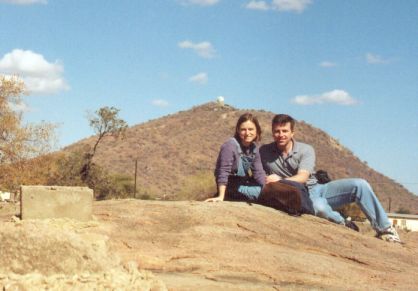I was the driver for the vaccine trip ... without four-wheel-drive and without basic skills like how to change a flat tire. I was not encouraged that Karen insisted I take her tire pump for the journey!
We started driving and soon turned off onto what appeared to be a footpath, which then disappeared altogether. The nurses instructed me where to turn: “left by that tree; no – that one”, “don’t run over those beans” … as far as I could tell, we were randomly weaving through the countryside, trying to avoid killing crops and chickens.

Then one nurse opened a window and started shouting announcements about the vaccine campaign in Mhuila, the local language, with a bullhorn. The bullhorn squeaked and crackled at great volume while the car bounced and bucked along. I had to laugh out loud at the sheer craziness of it all.
We finally arrived … at a tree. A small village of about 8 huts was nearby. We pulled the car under the tree to keep it shaded, and unloaded our gear. One nurse explained the benefits of handwashing both after pooping and before eating to the gathering crowd. She then led the villagers in a rousing song about the diarrhea, vomiting and death that occurs when one doesn’t wash one’s hands. The whole group – young and old, clapped and sang. She then reminded the villagers of the measles epidemic that had killed their children three years earlier, and explained that the vaccines would help to prevent this. Another nurse translated all of this for me from the local language into Portuguese. In this rural village, I met only one woman who spoke Portuguese.

The vaccine "clinic"
After the nurse spoke, the “mais velho” (pronounced “mishe velyu” - oldest man, or chief) of the tribe gave another vigorous speech about how important it was to vaccinate all the kids, how he fully supported the vaccine efforts. It was truly inspirational.
Then we started registering the kids – they produced their vaccine cards and one nurse marked what vaccines they needed that day. Another nurse set up the scale for babies (a cloth sling that hangs from a tree branch), and another started giving vaccines.
Gaby, Jessica and I were led to the village to the home of the mais velho, to do prenatal exams. The chief’s hut consisted of two small rooms with a rickety wooden chair, a few beer bottles, and a grass mat that we used for the prenatal exams. We had a bathroom scale, a tape measure, and a very old fashioned stethoscope-like contraption for listening to babies’ heart beats. After the prenatal visits, we returned to help with vaccines.

Two hours later we were packing up, being handed roasted corn for the journey home. Somehow we made it back … with the excellent navigation skills of the nurses. We had done 16 prenatal visits and vaccinated 56 kids and pregnant women.
In addition to vaccination campaigns, the Chiambengala hospital also runs preventive care clinics in eight outlying communities for pregnant moms and kids under five. The project’s community education focuses on tuberculosis, malaria prevention, maternal/child wellness, and HIV. They recently did a door-to-door survey of 10,000 people to find undetected cases of tuberculosis, and to educate the community about the disease.

It’s funny – I’ve always believed in public health in theory – clean water, mosquito nets, health education, vaccines. But I’ve never wanted to do much public health. I just love the one-on-one interaction of patient care; that’s why I went into medicine. But this year, for the first time, I believe that public health is important in reality, not just in theory.

I have lost far too many patients to cerebral malaria – who either got no treatment for days, or got inadequate or misdirected therapy from local health posts before coming to the hospital. Malaria can be treated very easily, but it has to be treated early and completely. It can also be prevented by things like mosquito nets and DDT wall-spraying campaigns. I would like to work on preventing malaria transmission, educating families about the need for early treatment of fever, and training local health posts about appropriate treatment of malaria. I am tired of losing patients who could have lived.
Likewise, hypertension. I regularly see patients in clinic with systolic blood pressures over 200. Many have received various anti-hypertensive medications for 1-2 weeks at a time. Very few have ever been told that hypertension is a disease that requires lifelong control. This would not have struck me so much, except that we also regularly see people who now have irreversible brain damage from strokes. This week two of my patients died in one day from sequelae of strokes. The community and its health posts need education about hypertension. We need to introduce continuity of care, which appears to be virtually nonexistent.
While I personally get more daily satisfaction from sick people made well, public health under a tree sure is fun, and it is Good work, and I hope to be a part of it in the future.

Daily we are grateful for the time we have here, for our ever-smiling staff, for our generous patients. Please pray for our wisdom as we work, and for healing and hope for our patients. Thanks all!!! Beth and Robert




2 comments:
I am so thankful for you both and your dedication to the Lord and to the practice of medicine. I hope you both sleep very well at night, knowing that you are going such a service to the Lord and to these people.
God bless, June Sinclair
Beth and Robert:
finally I found time to review your complete blog.
The combination of public health and surgery, ostensibly polar opposites, are, along with the Global Fund diseases TB,AIDS and Malaria, the greatest needs in Africa and most other LDCs.
Blessings on your work,
Ron Pust in Arizona
Post a Comment